Ivo Ivanov Sound Design Tools
 Find Ivo @
Find Ivo @
Official website
Glitchmachines
Soundcloud
Brief list of credits:
Twisted Tools, Glitchmachines, Samplephonics, EURYDICE
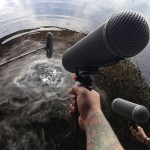
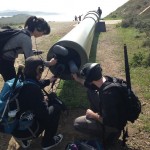
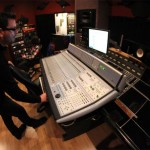
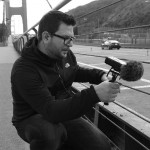
Tell us a little about yourself and what you do for a living?
I'm a sound designer and audio engineer, and I run a creative audio software company called Glitchmachines. I specialise in creating stylised sound effects, with my specific interest revolving around science fiction, horror and fantasy themes. While running Glitchmachines is my full time job, I've also worked on projects with companies like Ableton, Twisted Tools and SoundMorph to name a few.
What is your niche or speciality, that makes you stand out from rest of the audio professionals?
I'm known for my vivid and experimental design aesthetic. I'm not the designer you'll call when you need a library of foot steps. When it comes to abstract alien technology or foreboding drones, however, I have a lot to bring to the table. I've also been studying synthesis and music production since the late 1980s, which has been very useful in the multitude of music production-related projects I have worked on.
You are also quite known for your custom made hardware. Can you give us a brief overview on how you started with making custom hardware and what is your personal favourite piece of hardware that you have build?
Actually, this is how Glitchmachines started. I became interested in circuit bending around 2004, as it pulled together a lot of things I was interested in at the time; hardware modification, sound design, synthesis, circuitry, interface design, etc. I started to experiment with cheap toys purchased at a local thrift store, read some electronics theory books, and started experimenting. Pretty soon, I was able to achieve some very rewarding sonic results which eventually motivated me to build some units for sale. Things escalated quickly thanks to my social media pages, and people started to contact me for custom instruments. One of my favourites is Richard Devine's dual arcade joystick "Logic Bomb" keyboard.
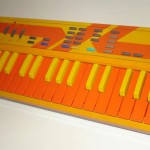
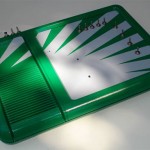
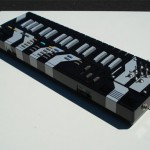
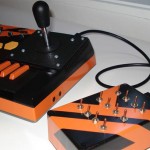
What are your go-to plug-ins and software? (virtual instruments, audio processing etc.)
Although I've worked with a big portion of the DAW software on the market, my current DAW of choice is Ableton Live 9 Suite. I prefer its interface and workflow over the other options (many of which I own). If I'm doing something for personal use, I use Renoise. I love the tracker way of writing electronic music – there is something very technical and precise about it that I truly enjoy. In terms of instruments, I am slowly replacing things with our own programs. I still use quite a few plugins though, such as the Valhalla DSP stuff, 2C Audio, Sonic Charge, Alchemy, Reaktor, Kontakt, SoundHack, GRM Tools and many other unknown/obscure plugins.
When do you find you are most creative?
I'm currently in "night mode" (working late nights), but I think I was clearer and ultimately more productive when I was in "morning mode". I have two small children and a family, and my office/studio is at home so I have to work around various related dynamics. Generally speaking, I find that I'm the most creative after I've been away from the studio for a few days. Going on a day trip with my family always seems to spawn a rejuvenated sense of enthusiasm to get back into the studio. Ironically, I'm never in the studio when my best ideas strike. I use my phone to document such ideas, which I later put into an ideas database – this works wonders for me.
What is your usual process for creating audio content for games, films etc.?
It really depends on the project. I try to switch up my workflow, tools and anything else I can change in order to motivate me to take a somewhat unique approach each time I start a new project. Of course there are certain things that need to remain in place for my work to sound consistent. What I will typically do is reserve specific tools for particular projects that would benefit from them. An example of this was RX2, which I used extensively during the Microsphere design process. I didn't use it as a noise reduction tool so much as a creative sculpting tool to bring out characteristics of the electromagnetic recordings without which the potential for redundant material was high.
Are there any particular secrets to your creativity?
I have an audio engineering degree, so it's hard not to approach things from a very technical perspective. That said, my "secret" is that I don't overthink things and simply listen to my instinct. I try to connect with sounds on an emotional level first and foremost. I also produce a lot more material than whatever makes it into a final product. If, for example, a library consists of 1000 sounds, there were probably 5000 sounds before I started the process of hand picking what I believe to be the best material for that project. I feel that this ultimately makes my work better, as I am not confined by the limitations of having a lack of material and consequently having to settle for "good enough". I also compartmentalise my workflow to compliment the way the brain works. What I mean are the left brain vs. right brain dynamics. If I'm editing, I'm in left brain mode and I stay there. If I'm designing or recording, I'm in right brain mode. This really helps me concentrate and stay productive. The brain generally doesn't like to jump back & forth between modes and re-aligning my workflow like this has really shown me significantly better results.
Do you have any audio creation techniques that resulted in something interesting?
My favorite thing to do is to use extreme processing on "organic" recordings. Something about the nuances of natural sounds can not be replicated in the computer. Recently, I took some friends on a field recording trip and we brought some dry ice. Pressed against certain metals, it will produce extremely eerie and interesting tones. Bowing cymbals with a cello bow is a lot of fun too. I also love my electromagnetic coil mics. These pick up all sorts of things in electronic devices that the naked ear can't hear.
Any specific "lessons learned" on a project that you could share?
Getting too many people involved can be a problem. I've learned that keeping a small hand-picked team on a project leads to much better communication and ultimately a more productive and professional environment. On a more personal note, I've learned the lesson not to let others influence my creative direction in a negative way. What I mean is that I don't try to tame or dumb down my work just to make it more "accessible". The few times that I've made this mistake, I've regretted it quite a bit later on. At the end of the day, there will always be someone who dislikes what you do, so why not just go forth with your unique vision instead of selling yourself short just so you can "play it safe"?
Any tips, hints or motivational speeches for the readers?
Develop your soft skills as much as your audio skills. You can be the best sound designer in the world, but if you can't write a coherent email, show up on time or behave in a humble and professional manner, you will have a hard time building your career. Also, don't be the victim of your own tool kit. I've met a lot of designers and engineers who rely very heavily on a specific set of tools (software, hardware) without which they find themselves crippled. Learn how to get good results no matter what equipment you have access to and you will be able to function in pretty much any capacity! Lastly, don't wait for other people to give you opportunities – the day may never come. Take things into your own hands and start something yourself. Eventually, the people
you idolized may actually come to you on their own accord.
Ivo Ivanov Sound Design Tools
Source: https://theaudiospotlight.com/ivo-ivanov-glitchmachines-interview/
Posted by: sullivanwhinged.blogspot.com

0 Response to "Ivo Ivanov Sound Design Tools"
Post a Comment